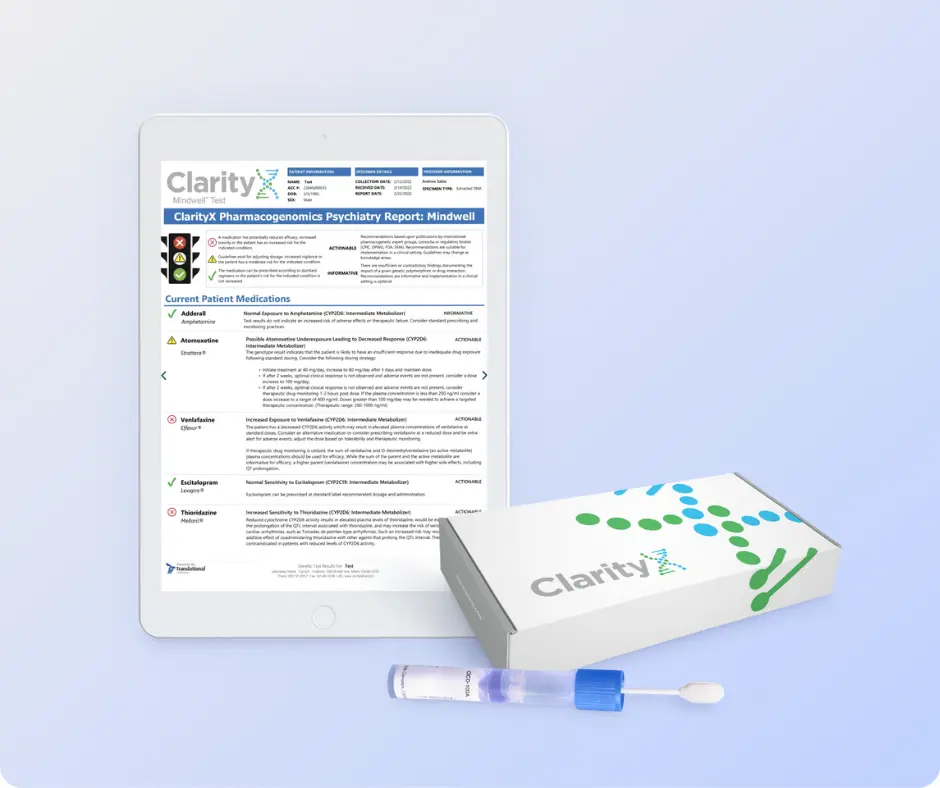Learn about the differences between Prozac® and Zoloft® and how a genetic test may help you determine which antidepressant is right for you.
Depression is a serious mental health condition that affects a staggering number of individuals every single day. In the U.S. alone, an estimated 14.8 million adults experienced at least one major depressive episode in 2020.1 While world events may have majorly contributed to this number, that’s still 6.0% of the entire U.S. adult population and those are only the numbers that were reported for people aged 18 and older – the total number of people suffering from depression includes an additional 4.1 million adolescents, with numbers growing each year.
Major depression is a common mental disorder that fluctuates in severity between individuals. Some experience minor mood shifts and temporary emotional responses, whereas others become so debilitated that it interferes with their ability to function at school and work. In these cases, antidepressants may help.
Prozac vs Zoloft
Both Prozac and Zoloft are antidepressants that may help individuals with diagnosed depression manage their symptoms. Antidepressants are not a cure for depression, but they are intended to help reduce the severity of symptoms associated with the condition. A study conducted by the Center for Disease Control (CDC) found that between 2015 and 2018, about 13.2% of American adults had reported taking antidepressant medication throughout the past 30 days.2 These numbers are expected to have grown in the years since, but conclusive research is still underway.
Antidepressant medications come in many forms, including SSRIs, SNRIs, NaSSAs, TCAs, SNaRIs, MAOIs, and more. Selective serotonin reuptake inhibitors (SSRIs) are the most commonly prescribed form of antidepressants. Both Prozac and Zoloft are SSRI antidepressants used to help manage the symptoms associated with depression.
Prozac vs Zoloft: What are They?
SSRIs are antidepressant medications that are meant to increase the serotonin levels in the brain as a means of helping alleviate symptoms associated with depression. Serotonin is a neurotransmitter that transports signals between neurons (brain nerve cells). By blocking the reabsorption of serotonin into neurons, SSRIs enable individuals with depression to use serotonin more efficiently.
Individuals who have been diagnosed with depression typically experience feelings of sadness, hopelessness, and a general loss of interest. Depression may show up in many ways, so it is important to think beyond the stereotype of simply “feeling sad” when looking at depression. People who have depression may have trouble completing what feels like normal day-to-day activities to others; they may feel anger, irritation, or frustration over seemingly small things. Depressed people may also experience insomnia, extreme tiredness despite getting enough sleep, suicidal thoughts, and physical symptoms such as headaches and pain.
Both Fluoxetine (Prozac) and Sertraline (Zoloft) may be able to help with depression, but how they interact with individuals depends on individualized metabolisms, body chemistry makeup, and many other factors.
It is important to understand the differences between Prozac and Zoloft so you can make an informed decision about which one will be best for you. Let’s take a closer look at how each of these antidepressant medications work.
What is Prozac?
Fluoxetine (Prozac) is an SSRI antidepressant medication. In addition to being used to help with the symptoms of depression, Prozac may also be used to reduce the frequency of panic attacks, to help with obsessive-compulsive disorder (OCD), as a treatment for bulimia nervosa, and as an aid in severe cases of premenstrual syndrome (PMS). Prozac works by regulating the amount of serotonin that the brain can access to result in a more stable mood. It helps more neurons stay present in the dentate gyrus part of the hippocampus, which is a vital part of the brain for memory formation.
What is Zoloft?
Another SSRI, Sertraline (Zoloft) is also an antidepressant medication that may be used for moderate-to-severe major depressive disorder (MDD), panic disorders, OCD, PMS, and social anxiety disorder. It works similarly to Prozac in that it helps rebalance serotonin levels in the brain.
Prozac vs Zoloft: Common Side Effects
Introducing a new medication of any kind into your system comes with a risk of side effects that may affect individuals in different ways. Certain side effects are common, with most initial side effects subsiding after a few weeks on a medication. Read on to learn about some of the most common side effects users may experience with Prozac and Zoloft.
Side Effects Common with Prozac
Some people who take Prozac experience the following side effects:
- Nausea
- Drowsiness
- Dizziness
- Trouble sleeping
- Loss of appetite
- Fatigue
- Sweating
- Sexual dysfunction
- Tremors
- Agitation and anxiety
Although uncommon, some individuals may also experience more serious side effects with Prozac such as impaired judgment and thoughts, allergic reactions, mania, vision problems, changes in weight, and more. Not everyone who takes Prozac will have these side effects. Additionally, keep in mind that this is a list of some but not all side effects individuals may experience on Prozac. For more information and guidance, please speak with your healthcare provider.
Side Effects Common with Zoloft
Taking Zoloft may come with certain side effects, many of which are similar or the same as those of Prozac. Common side effects of Zoloft include:
- Headaches
- Nausea
- Diarrhea
- Dry mouth
- Increased sweating
- Nervousness
- Restlessness
- Insomnia
- Loss of appetite
More serious side effects such as serotonin syndrome/toxicity, low sodium levels, glaucoma, and seizures are rare but should be addressed by a medical professional immediately.
How people respond to medications such as Prozac and Zoloft depends on a variety of factors and varies from individual to individual. Side effects typically usually lessen over time and dosage may impact the severity of side effects. Please consult your doctor or a healthcare professional if you experience lingering or unwanted side effects from taking any medication.
Prozac vs Zoloft: Dosage
Prozac Dosage
Prozac should always be taken as prescribed by your doctor. Your doctor will prescribe you the dose they feel is appropriate for your symptoms and your condition. This will typically start at a low dose and gradually increase as needed.
Dosage for Prozac is highly individualized. Oral dosage comes in many forms, including capsules, delayed-release capsules, pulvules, tablets, and as a solution. Capsules range from 10 mg doses to 40 mgs. Delayed-release capsules are available in 90 mg capsules. Tablets range from 10 mg to 60 mgs and oral solutions are available at 20 mg/5ML.3
Additionally, certain individuals (i.e., those with bipolar disorder) may be prescribed Prozac along with another medication depending on their needs. Please make sure to only take Prozac as prescribed by your doctor and at the same time each day. A missed dose should be taken as soon as possible; if it is too close to your next dose, it is advised to skip the missed dose and resume normal dosing without doubling up.
Zoloft Dosage
Just like Prozac, Zoloft should always be taken exactly as prescribed by your healthcare provider. Please do not exceed the dosage amount or frequency that was prescribed to you. Similar to Prozac, Zoloft is available in tablet, capsule, and oral solution form. Capsules are available at 150mg and 200mg doses; tablets come in 25mg, 50mg, and 100mg; oral solutions are available at 20mg/mL.4
Your doctor will advise which dosage is suggested for you based on your symptoms, family history, medical history, and risk of side effects.
Prozac Vs Zoloft: How Long Does It Take to Start Working?
How long it takes for Prozac and Zoloft to start working depends on a variety of factors, some of which include your body’s chemical makeup, height, weight, and other medications you may currently be on. Some people see energy, sleep, and appetite improvement within the first 1-2 weeks of starting treatment, whereas others take 6-8 weeks for the medication’s effects to become noticeable. Neither Prozac nor Zoloft are designed to have immediate effects. Some individuals may report immediate improvement, but please keep in mind that this could be due to a placebo effect.
Prozac Vs Zoloft: How Long Does It Last?
Regardless of the drug you are taking, its half-life indicates the amount of time it takes for about half of the dosage to get metabolized by the body. Prozac has a half-life that can range from 1-3 days depending on the amount of time the individual was on the drug. Longer-term usage of Prozac typically yields a half-life of between 4-6 days. According to Harvard Health, it usually takes about 25 days for 99% of the drug to be eliminated from the body.5
Zoloft has an average half-life of about 1 day, but traces of the metabolite desmethylsertraline may remain in the body for up to 66 hours.6
When weaning off any SSRI medication, it is important to do so under the supervised care of a healthcare professional. The original symptoms of depression may reappear as well as others during the withdrawal period. Withdrawal symptoms for Prozac and Zoloft should subside within 2 weeks.
Prozac or Zoloft: Which One Should I Take?
While both Prozac and Zoloft are in the antidepressant group of drugs, there are unique reasons to take one over the other. Conditions, desired effects, usage, and side effects are often what causes patients to choose Prozac vs. Zoloft, but there are other deciding factors that should be taken into account. After reviewing the features of each and the potential side effects you may experience, it will be up to both you and your healthcare professional to determine whether Prozac vs. Zoloft will be better suited for your needs.
ClarityX: DNA Testing for Medication
The DNA in our bodies contains valuable information that may help determine how we will respond to certain medications. ClarityX examines DNA to uncover this information and provide patients with detailed analyses on how they may react to taking certain drugs. We look for variations with the Cytochrome P 450 enzymes (which metabolize over 70% of drugs). ClarityX offers two testing options with our pharmacogenetic testing:
- Mindwell test: This focuses on treatments for mental health conditions that include but are not limited to depression, anxiety, ADHD, OCD, and more.
- Max Rx test: This covers 31 therapeutic areas to test how an individual may respond to more than 265 medications.
Both the Mindwell and Max Rx tests may help determine how you will react to Prozac and Zoloft. This could help you and your healthcare provider make more informed decisions about your treatment plan. Click here to learn more.
1https://www.nimh.nih.gov/health/statistics/major-depression
3https://reference.medscape.com/drug/prozac-fluoxetine-342955
4https://reference.medscape.com/drug/zoloft-sertraline-342962
5https://www.health.harvard.edu/diseases-and-conditions/going-off-antidepressants





